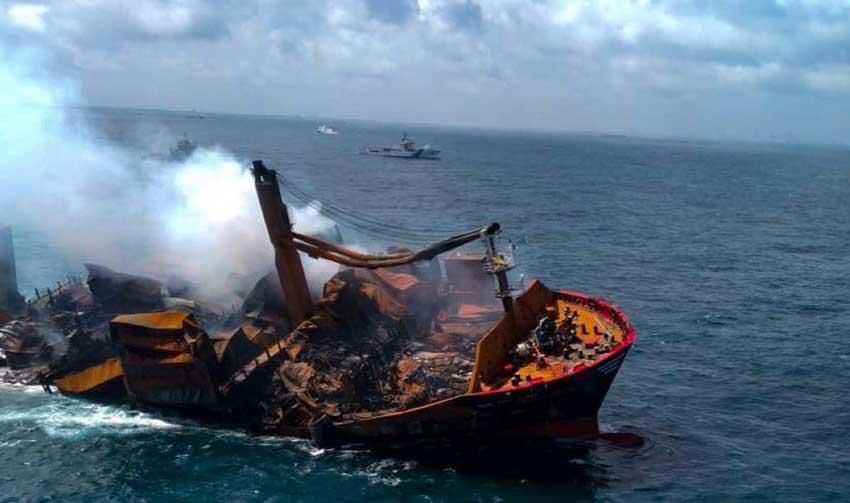03 Jun 2021 - {{hitsCtrl.values.hits}}

The sinking X-Press Pearl (Image courtesy : SLAF)
The crew has to be taken into custody and criminally prosecuted
An unseaworthy vessel being brought down is a grave offense
Assessment of damage could go up to billions of dollars
When X-Press Pearl made a distress call regarding a fire onboard the vessel the ship was already in Sri Lankan waters
Here, the International Maritime Dangerous Goods (IMDG) Code should be followed. Until a berth is available the ship can be kept outside the port
 Successive governments have carried out massive propaganda campaigns to promote Sri Lanka as a maritime hub. However, maritime law experts are of the view that Sri Lanka doesn’t have a proper legal framework to remedy maritime disasters such as that of the X-Press Pearl inferno and that the country is not equipped with preventive strategies in the event of a maritime disaster. Insufficient laws and ambiguities have been observed in the existing law, particularly the Marine Pollution Prevention Act No. 35 of 2008 which needs to be reformed in order to execute a proper legal process in these kinds of events.
Successive governments have carried out massive propaganda campaigns to promote Sri Lanka as a maritime hub. However, maritime law experts are of the view that Sri Lanka doesn’t have a proper legal framework to remedy maritime disasters such as that of the X-Press Pearl inferno and that the country is not equipped with preventive strategies in the event of a maritime disaster. Insufficient laws and ambiguities have been observed in the existing law, particularly the Marine Pollution Prevention Act No. 35 of 2008 which needs to be reformed in order to execute a proper legal process in these kinds of events.
Shipowners and local authorities at fault
When X-Press Pearl made a distress call regarding a fire onboard the vessel the ship was already in Sri Lankan waters. “First and foremost, one needs to look at how this vessel entered our waters,” said Attorney-at-Law, Dr. Dan Malika Gunasekara, Legal Expert and Consultant in Ocean and Maritime Law. “I blame both the ship as well as local authorities. While the authorities say that they weren’t aware, the shipowners claim that they had informed. When a ship is having a leak and once the Captain has sighted it, his duty is to report it to the next reporting port. The owners are completely liable for bringing an unseaworthy ship to our waters. If there was a distress call, salvage operations could have been done even in the deep sea. This is a grave and serious offense. If our authorities had known about the leak, but didn’t act expeditiously after the captain and owners have disseminated information then the fault goes to our side as well. They are contributing to the negligence.” said Dr. Gunasekara.

“If the ship sinks there’s a possibility of an oil spill and we are ready provide an immediate response in that case. The Indian vessel is specialized in controlling marine pollution and in responding to mid-sea catastrophes”
- Navy Spokesman Capt. Indika De Silva
Protocols to be followed
However, berthing a ship at a port requires standard protocols. “When a ship is approaching another country’s ship calling port, the port authorities should obtain a cargo manifest to analyze if there are any dangerous cargo as in this case and take necessary steps to transport them safely. Here, the International Maritime Dangerous Goods (IMDG) Code should be followed. Until a berth is available the ship can be kept outside the port. In the case of X-Press Pearl it was located 9.5 nautical miles from the Colombo International Container Terminals. If the fire took place inside CICT we could have witnessed a similar devastation like the Beirut explosion because already there are ships with dangerous cargo at CICT. We are fortunate that it happened outside CICT,” he added.
Are the laws adequate?
The Marine Pollution Prevention Act No. 35 of 2008 includes provisions that can be used to file a case during such events. But Sri Lanka doesn’t seem to have learned from past experiences or been proactive in bringing maritime law reforms. “Criminal and civil liability provisions are available under the Penal Code of Sri Lanka as well as the Marine Pollution Prevention Act No. 35 of 2008,” he continued. “The Attorney General’s Department has reported to the Magistrate Court, but the charges seem to be minimal. These charges could very well be brought up. An unseaworthy vessel being brought down is a grave offense. We had ample time to reform our laws and claims that the law is not strong enough are not excuses in this situation. A civil liability case can only be taken under the MPPA, but the provisions aren’t strong enough. The laws are insufficient and there are many ambiguities. If we apply these clauses for this incident it’s quite possible that the case might get dismissed.” he explained.
Conditions to claim compensation
One of the major concerns was with regards to compensation given the larger environmental damage. However, many have speculated that Sri Lankan authorities would seal the deal like in the case of MT New Diamond. “I have been researching on the law for 10 years. Three years ago there was a meeting to suggest amendments to the law and revamp it with new legislation. But the relevant parties have been sitting on it ever since. In this situation it is doubtful if we will get adequate compensation given the existing loopholes in the law. We are still trying to boast that we are maritime hub, but these kinds of incidents never occur in a good maritime hub. It’s natural for ships to catch fire, but there are preventive strategies that could be implemented. However given this situation the crew has to be taken into custody and criminally prosecuted. A penalty between Rs. 4-15 million could be charged. A maximum of Rs. 15 million could be charged for a single case. The case should be heard in the Supreme Court.
From the civil perspective we shouldn’t hurry up like in the case of MT New Diamond. There we did a lot of mistakes such as getting Rs. 442 million as compensation for the entire damage and sealing the deal as a full and final settlement. If they didn’t sign it we could have claimed more compensation. Therefore we need a thorough assessment of the damage and see the quantum. It could go up to billions of dollars. We need to get down marine biologists, geologists and other experts to assess the damage. A good economist will be able to assess the livelihood cost of fishermen and economic impact on hotels. Therefore authorities shouldn’t hurry up with the compensation process.” he added.
However when asked if the affected country could still claim compensation even after the company declared that the ship is burning Dr. Gunasekara responded in the affirmative. “The insurer is liable and therefore the country can claim compensation against the shipowner.”
Dr. Gunasekara further said that the Colombo Port is one of the best 25 ports in the world and we need to have all those facilities in place in case if an emergency happens. “Negligence of authorities and the impending damage may affect our rank as well.”

An unseaworthy vessel being brought down is a grave offense. We had ample time to reform our laws and claims that the law is not strong enough are not excuses in this situation. A civil liability case can only be taken under the MPPA, but the provisions aren’t strong enough”
- Attorney-at-Law, Dr. Dan Malika Gunasekara, Legal Expert and Consultant in Ocean and
Maritime Law
Sinking hopes
On June 1, a team of salvors were able to board the ship and assess the possibility of towing the vessel. The same day, President Rajapaksa informed authorities to tow the ship into deeper seas. By June 2 morning the authorities warned of a water leak and that the ship is sinking possibly resulting in an oil spill. At the onset of the incident a No Fishing Zone was declared from the shore and vessels have been prevented from entering the sea from the Negombo lagoon while fishing activities from Panadura to Negombo were stopped with immediate effect. Further assistance has been sought from Indian
Coast Guard.
“Sri Lankan territorial waters lie within 12 nautical miles from the land and the ship is within this range,” said Navy Spokesman Capt. Indika De Silva. “The towing operation is done by the salvage company but two Indian vessels, SLNS Gajabahu, an Advanced Offshore Patrol Vessel and a Dora vessel is at the location. If the ship sinks there’s a possibility of an oil spill and we are ready provide an immediate response in that case. The Indian vessel is specialized in controlling marine pollution and in responding to mid-sea catastrophes.”
The Sri Lanka Air Force has deployed a Bell 212 aircraft to monitor the situation.
28 Dec 2024 2 hours ago
28 Dec 2024 2 hours ago
28 Dec 2024 3 hours ago
28 Dec 2024 3 hours ago